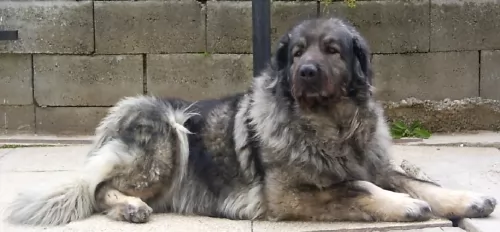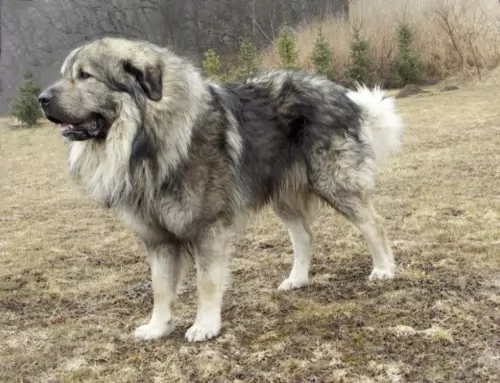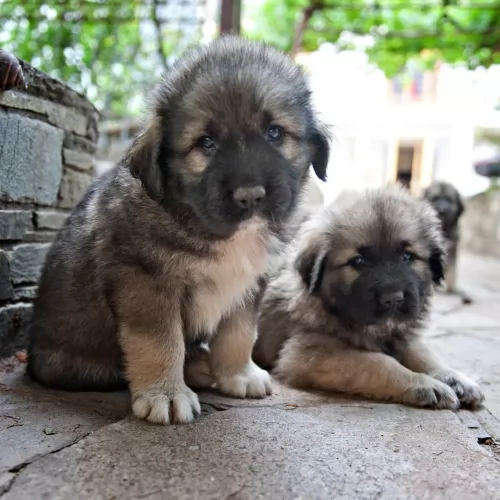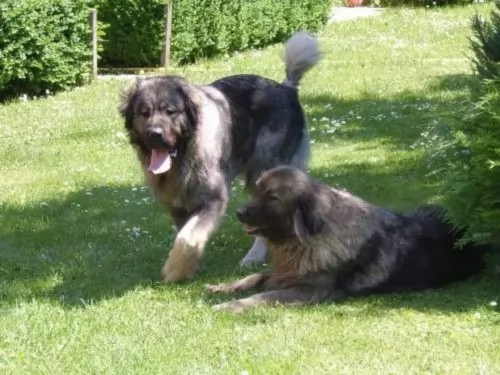 Petzlover
Petzlover Indian Spitz is originated from India but Sarplaninac is originated from Macedonia. Indian Spitz may grow 37 cm / 14 inches shorter than Sarplaninac. Indian Spitz may weigh 38 kg / 83 pounds lesser than Sarplaninac. Both Indian Spitz and Sarplaninac has same life span. Indian Spitz may have less litter size than Sarplaninac. Both Indian Spitz and Sarplaninac requires Moderate Maintenance.
Indian Spitz is originated from India but Sarplaninac is originated from Macedonia. Indian Spitz may grow 37 cm / 14 inches shorter than Sarplaninac. Indian Spitz may weigh 38 kg / 83 pounds lesser than Sarplaninac. Both Indian Spitz and Sarplaninac has same life span. Indian Spitz may have less litter size than Sarplaninac. Both Indian Spitz and Sarplaninac requires Moderate Maintenance.
 The Indian Spitz is a working dog and has always been used for hunting and tracking small game. It is a popular dog breed in India.
The Indian Spitz is a working dog and has always been used for hunting and tracking small game. It is a popular dog breed in India.
There isn't too much information on the exact origin of the dog but dog experts tell us the dogs have descended from different Spitz breeds and wild wolves, and that they date back thousands of years.
People often mix them up with the Pomeranian, but they're different, being introduced in India by the British. The British began breeding them from a stock of German Spitz's and years of breeding produced the ideal dog type which could cope with the tempestuous weather conditions in India.
They aren't recognized by any major kennel clubs but the Kennel Club of India is working to establish the Indian Spitz as a separate breed.
 Hailing from Macedonia, the beautiful Sarplaninac dog was developed as a guardian of livestock and is large enough to fight off large predators like bears and wolves.
Hailing from Macedonia, the beautiful Sarplaninac dog was developed as a guardian of livestock and is large enough to fight off large predators like bears and wolves.
Nobody is too sure of the breeds exact origins, though it is thought that its ancestors came to the Balkan Peninsula with people migrating from ancient Asia.
This huge dog is one of the oldest native breeds from ancient Molosser breeds. The dog was recognized in 1939, and in 1954 it became known as the Yugoslav Shepherd Dog. Later the name changed and the dog was recognized by the United Kennel Club in 1995.
 The Indian Spitz is an attractive, fluffy looking dog breed thought to have been domesticated thousands of years ago.
The Indian Spitz is an attractive, fluffy looking dog breed thought to have been domesticated thousands of years ago.
The dog comes in two sizes – the smaller- and larger size. The Smaller Indian Spitz stands at between 20 - 25 cm and weighs between 5 – 7kg while the Greater Indian Spitz stands at 35-45cm and weighs between 12 – 20kg.
The dog has a long-haired coat, with the hair on the head being shorter than the rest of the body. The color of the coat can be white, brown or black and white.
The Indian Spitz is an easy-going dog which adapts to all kinds of living conditions in India. They therefore adapt easily to life in the city or in the countryside.
The Indian Spitz is a social, friendly dog who is loyal towards his human family, showing his joy at being with them with high-pitched barking. He gets on well with children in the home and because he isn't aggressive, he gets on well with pets in the home too.
He is intelligent which means that he is able to be trained and socialized, turning him into an obedient pet who takes his job as guardian and protector seriously.
 The Sarplaninac is a large, strong, fluffy dog standing at between 54 and 62cm in height and weighing between 30 and 45kg.
The Sarplaninac is a large, strong, fluffy dog standing at between 54 and 62cm in height and weighing between 30 and 45kg.
The coat of the dog is dense, coarse and of medium length. Colors are different shades of grey, white, tan and black. The head is large, the ears are fairly short but are floppy and covered with short hair. The dog is deep chested and the tail is long, often held high and covered with thick, feathery hair.
Protective, reliable, reserved, stubborn and gentle, this intelligent dog is fairly serious, and while he makes a devoted family pet, he is cool and wary of strangers.
Excellent training and socialization makes him well mannered, balanced and obedient around different people. He will tolerate children but won’t take easily to other pets in the house, capable of becoming aggressive with them.
 Playful, feisty, intelligent, loving and loyal, the Indian Spitz is full of character and just loves being in a loving family home.
Playful, feisty, intelligent, loving and loyal, the Indian Spitz is full of character and just loves being in a loving family home.
Easy to train, he becomes a wonderfully obedient canine friend who loves nothing more than to spend time with you, especially when it is outdoors going for a walk or playing ball.
He is an entertaining little dog too, and anyone wishing to buy a dog like this won't regret it as he brings in a joyful dimension to any home.
 These dogs are protective, but they’re not vicious. When properly raised they are wonderful family pets.
These dogs are protective, but they’re not vicious. When properly raised they are wonderful family pets.
True, it’s a large, strong willed dog that isn’t a good choice for the first-time dog owner. They are good with children, but only children who have been taught how to treat animals with care and patience.
This dog is a powerful guardian type of dog, imposing in size, but it’s all about upbringing, and if you bring him up well then he can make a tremendous pet and companion.
 These feisty little dogs can reach 14 years of age if looked after well.
These feisty little dogs can reach 14 years of age if looked after well.
Your Indian Spitz will need to see a vet when he is 6 weeks of age for his first vaccinations and also whenever he is sick.
He is a dog breed that doesn't get sick very easily, but still it is wise to know about some of the more common dog diseases that could plague your little pet, and these are among others, hip dysplasia, epilepsy, cancer and vision- and dental problems.
It is important to be keeping an eye on your dog's oral health. Infected teeth can have a bad impact on his health and can actually contribute to heart- and kidney disease for instance.
One of the major causes of dental disease in dogs is none other than diet. Always try to feed your pet the best quality food there is. Certainly if you feel your pet isn't getting the best food, try a probiotic supplement as this can create a healthy bacterial environment in your dog’s mouth.
Check your pet's mouth regularly so you can attend to any dental problem before it gets out of hand.
 The Sarplaninac dog is a robust dog but he can suffer from health issues such as hip dysplasia, obesity, bloat, ear infections and skin allergies.
The Sarplaninac dog is a robust dog but he can suffer from health issues such as hip dysplasia, obesity, bloat, ear infections and skin allergies.
When your dog gazes up at you with such love in his eyes, don’t be tempted to pop some chocolate into his mouth or let him finish off your ice-cream. Treats like this can damage your pet’s health and give him heat intolerance, breathing difficulties, hypertension, liver disease and diabetes.
 These dogs have been used to a diet of milk and rice, but if possible it can be beneficial to the dog to include some cooked chicken and vegetables too. Raw meat is also important, but it is expensive, so just adding it in from time to time can still be beneficial. Water which is cool and clean should be available to the dog day and night, non-stop.
These dogs have been used to a diet of milk and rice, but if possible it can be beneficial to the dog to include some cooked chicken and vegetables too. Raw meat is also important, but it is expensive, so just adding it in from time to time can still be beneficial. Water which is cool and clean should be available to the dog day and night, non-stop.
Your Spitz dog will simply require a brush twice a week to keep it clean and vibrant and free from loose hairs. While brushing him, make a point of checking him for fleas and ticks as well.
This is a busy little dog that wants to involved in everything you're busy with. He will love to join you in your long walks each day or if you take him to the park, he will love the chance to run off his leash.
 Every dog needs care from puppyhood through to old age.
Every dog needs care from puppyhood through to old age.
Šarplaninacs are looked upon as medium maintenance dogs. The coat is long and thick and requires a firm bristle brush to get their hair brushed.These dogs are moderate shedders so a brush twice a week will do the trick to keep the hair free of loose hair and matting.
Because these dogs have floppy ears, they will need to be checked and cleaned. Floppy eared dogs battle with moisture and wax build-up that increases the likelihood of ear infections.
Check the eyes that they are clear and free of discharge. Eyes with a lot of discharge can be indicative of health problems.
Check for any unusual lumps as cancer often starts with a new lump.
Provide your pet with a nice warm, dry place to sleep.
Keep his vaccines up to date to prevent deadly canine diseases.
Have him or her spayed or neutered if you don’t want puppies. These are regular procedures for a vet and offers health benefits for the dog. Neutering a male improves his character and keeps him from roaming. These dogs are capable of having 3 – 8 puppies.
The Sarplaninac requires decent food if he is to remain healthy. Dog’s stomachs can become upset if they eat all kinds of sweet and spicy human foods.
Commercially manufactured dog food is a good backup food to have because of its convenience. Try to include some home-made food. Simply add into one big pot chicken, brown rice or pasta and spinach, sweet potatoes and carrots. This food can all be chopped up and added in to the dry kibble twice a week. Give this to your pet twice a week and see how his tails wags when he smells it.
Also try to add in some raw meat to his food occasionally.
Ensure there is always a bowl of fresh, cool water within his reach.